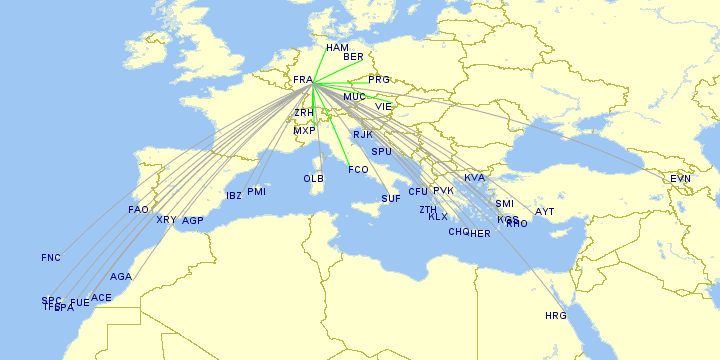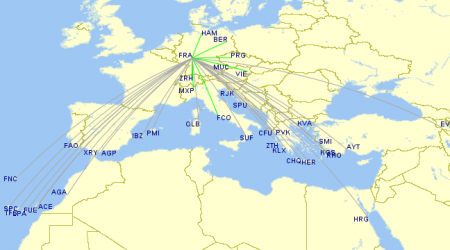Welcome back from the holidays. It’s that awful first day when everyone is back working and nobody wants to be. So, let’s pretend we’re all still on vacation by talking about a holiday-focused airline. Today, it is time to discuss Condor and its recent massive change in its long-haul network.
Condor is a fairly remarkable leisure airline. I mean “remarkable” in the sense that it is still flying despite having multiple opportunities not to be. At one point it was a part of Thomas Cook, but we know what happened there… Thomas Cook failed. After a government bailout from its home country of Germany, Condor got back on its feet as a standalone airline and began a big expansion.
On long-haul — which is what we’re talking about today — it replaced its ancient 767s with brand new A330-900neos, and it really leaned heavily into the North American market. Pre-pandemic, it toyed with some of that flying from Munich, but post-pandemic it was entirely focused on Frankfurt (except for a handful of Dusseldorf – New York flights each year).
After years of trying to serve markets that didn’t have much long-haul service, Condor decided to throw larger markets into the mix. Los Angeles and San Francisco started in 2022. Edmonton joined a year later, and in 2024, Cabo, Miami, and San Antonio were added. As George Martinez might say, only the Condor would be so bold. (I’m guessing 99.9 percent of you won’t get that reference, but if you happened to have loved The Brak Show 20 years ago, then welcome to this very small and irrelevant club.)
The A330s weren’t just new airplanes. They had a much nicer onboard product, and Condor was betting on some of these bigger markets working thanks in part to a nice, inexpensive flat bed experience to and especially beyond the Frankfurt hub.
The only real problem with that plan is that Condor wasn’t really providing its own feed beyond Frankfurt. The competition authorities in Germany had forced Lufthansa to provide an interline agreement to carry Condor passengers beyond Frankfurt, so this was a great way for Condor to fill its long-haul airplanes. It used its own short-haul airplanes to fly mostly north-south leisure routes in Europe and Africa. But now things are changing.
July 2025 vs July 2024 Condor Narrowbody flying from Frankfurt
Green is new in 2025, Maps generated by the Great Circle Mapper – copyright © Karl L. Swartz, Data via Cirium
The courts have struck down this deal, so Lufthansa no longer has to provide interline connectivity, and that means Condor is in a world of hurt. It has to make big changes in light of this shift.
So, what is happening? Well, it did add some nonstops from Frankfurt to those cities in green on the map above. Berlin, Hamburg, Milan, Munich, Prague, Rome, Vienna, and Zurich are all the kinds of cities that are likely to provide a decent amount of long-haul feed for North Americans traveling to Europe. But that wasn’t enough.
Over the Atlantic, six markets are being dropped: Baltimore, Edmonton, Halifax, Minneapolis/St Paul, Phoenix, and San Antonio. Why those? Well, let’s take a look.
Condor US/Canada Market Data for July 2024
ARC/BSP Data via Cirium, lighter colors are being dropped
The first three on the left are pretty easy in that they have the largest percent of traffic that connected over Frankfurt. It’ll be harder to fill those airplanes without Lufthansa. Toronto, however, is staying, and I’m a little surprised about that one. Maybe it’s just that it’s a primary, large city, so Condor thinks it can generate enough local traffic. Anchorage and Calgary both stay, but they both drop from 5x to 3x weekly.
I’ll admit that of everything in the network, I’m somewhat surprised that Portland sticks around with such a high percentage of that beyond-Frankfurt traffic originating in North America. I’d think that would be tougher to replace. It looks somewhat similar to MSP and Phoenix which do go away.
With all these flights culled, what is Condor going to do with all that airplane time? It’s adding three new routes to start, and none of them are in the US or Canada. Next summer will now get 5x weekly to Bangkok, 3x weekly to Johannesburg, and 2x weekly to Panama City (Panama). Presumably these are markets that Condor thinks can generate a lot of local traffic.
These routes will now fly through fall, unlike some of the canceled ones, so that’s a benefit, but Condor is still underutilizing its fleet in summer.
A330-900neo Block Minutes by Month
ARC/BSP Data via Cirium
That may mean that Condor is planning on shifting some of its maintenance into summer instead of fall, or it could mean that Condor isn’t done remaking its network just yet.
As we head into the prime summer booking season, Condor is lucky that it could at least act quickly and shift over the holidays before it would really fall behind on the booking curve. But this is a big change for an airline that has had quite an odyssey over the last several years, and it is far from certain that it will work. Undoubtedly this will be fought on two fronts… in the courts where Condor will hope to get back that Lufthansa deal, and in the skies where Condor is not feverishly looking for a viable strategy in a new world.
























